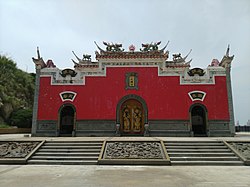Nangan is an island in the Matsu region of Taiwan. It is the primary and governing island for the Matsu Islands. It is also the largest of the islands. Most flights and boats will fly into Nangan. There are many things to see and most signs are in English, albeit some travelling requires guess and test.
Villages
editUnderstand
editSince Nangan is the main island, there is massive military presence on all corners of the island. China is only a few miles off the coast and quite easy to see on a clear day. Nangan is also the main island, so travelling between islands is mainly via Nangan.
Also do not fear the roads. It may look like a sidewalk, but it is probably a road.
- 1 Matsu Tourist Information Center (馬祖旅遊服務中心). For more information about the island and local attractions, you can enquire here.
Get in
editBy air
edit
- 1 Matsu Nangan Airport (馬祖南竿航空站), ☏ +886 8 362 6505. The airport connects the island with fairly regular flights to Taipei and Taichung.
By sea
editGet around
editIt is highly recommended you rent a scooter from the airport or Fuao harbor. Go to the Visitor Information and ask for help.
Also do pickup the English Backpackers Guide. It has highly detailed itineraries and somehow manages to provide an incredibly useful map.
See
editCulture and history
edit
- Beihai Tunnels - A deep tunnel carved into the rock during the late 1960s as a military installation that is now open to the public.
- 1 Nangan Beihai Tunnel (北海坑道), ☏ +886 8 362 2177. 08:30-17:00. A 700m deep tunnel in Nangan district.
- 2 Beigan Beihai Tunnel (北海坑道).
- 3 Dongyin Beihai Tunnel (北海坑道).
- 4 [dead link] Ching-kuo Memorial Hall (經國先生紀念堂). Built in a similar vein to the Chiang Kai-shek memorial in Taipei, this complex is built to honour his son, Chiang Ching-kuo.
- 5 Daao Old Street (大澳老街). An old area of the island featuring a number of old stone buildings.
- 6 Dahan Stronghold (大漢據點). A former ROC military fort which has since been redeveloped as a tourist attraction. The site was completed in 1975 when the island was still under direct administration by the military.
- 7 Statue of Mazu (媽祖巨神像). A large statue of the goddess Mazu facing out to sea.
- 8 Tunnel 88 (八八坑道). 9-11am. This tunnel was built centuries ago to defend the locals from pirates. Later it was used by the military and now it is used by the Matsu Distillery. The timings are odd and change frequently. Keep in mind the floor is sticky and the tunnel has a strong scent of Gaoliang. free.
Museums
edit
- 9 Matsu Folk Culture Museum (馬祖民俗文物館), ☏ +886 8 362 2167. T-Su, 09:00-17:00. A museum showcasing the history of the island and its inhabitants.
- 10 Blue Tear Museum (藍眼淚生態館), ☏ +886 8 362 3338. 10:00-21:00. A small museum focusing on the marine life in the area. This museum has very little material available in English.
Temples
edit
- 11 [dead link] Tianhou Temple (天后宮), ☏ +886 8 362 2913.
- 12 Niujiao Wulinggong Temple (牛角五靈公廟).
Do
edit- Nioujiao (Fuxing) Village. Beautiful granite village built at the edge of a mountain on the sea. Check out the temple on the harbor and spend hours getting lost in its tranquility.
- 1 Matsu Distillery. 9-11am. As every region in Taiwan is famous for something, Matsu is known for its Rice Wine, Gaoliang. It is incredibly strong and the smell can not be missed. The Distillery can be found by just using your nose. They will have you watch a movie and then liberally provide you with shots. It is a definitely recommended trip, that you may potentially forget (be careful!). free.
Eat
edit- 1 Leemo's Restaurant (依嬤的店). A local restaurant in Niujiao village, operating in a traditional-style stone building.
Markets
edit- 2 Jieshou Shizi Market (介壽獅子市場). A traditional market selling fresh produce and cooked food.
Cafes
edit- 3 Furen Cafe (夫人咖啡). A small cafe by the sea which is housed in an old, traditional-style stone house.
Drink
edit- 1 Matsu Distillery (馬祖酒廠). The distillery features an exhibition room which exhibits several different Kaoliang liquors from different period, discontinued medical liquors, as well as tools used for liquor production..

